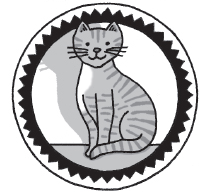
Our cat, Mimi, who was always known as Meems, lived with us from 1990 to 2004. She was a tabby cat with one white shoulder, and my husband described her perfectly as the kind of creature you can imagine with a handbag in the crook of her arm. She was elegant and beautiful, like very many cats, but had about her an air of femininity and sweetness that was quite unusual. The fierceness sometimes associated with tabby cats was completely missing from her looks and her character. She was the very opposite of a hunter. She’d crouch on the step and look in a meaningful way at squirrels racing past her nose without ever chasing any of them. She never once in fourteen years brought in a mouse or a bird, for which we were very grateful. Some people said the reason she never hunted was because we spoiled her rotten, but I don’t believe that . . . I think the hunting instinct is something a cat either has or doesn’t. Still, it’s true she was pampered. She had dry food and wet food and water out for her pleasure every day. She was never left in a cattery, and indeed for the time we had her, my husband and I took separate holidays so that Meems wouldn’t have to be on her own, even for one night. We thought of her as one of the family and loved her very much. When she died, of an illness that we could no longer get treatment for, we were bereft. I kept seeing her out of the corner of my eye in every part of the house for a very long time. We think of her often and remember her with delight and pleasure. She was a loving and lap-sitting cat, and not one of the standoffish kind. I’m really pleased to think that people will be able to read about her now. Here’s a poem I wrote about her.
From her position on the windowsill
she gives the garden her consideration.
Later, both the camellias and the ferns
will undergo a full investigation.
First, she will be a small domestic sphinx
unmoving on the carpet, enigmatic,
thinking: there was a fire here last night
and now it’s gone. All life is problematic.
The second serious question of the day
is: where to sleep? Which bed or chair to grace?
The velvet spaces of the chesterfield?
Or should she seek a woolly resting place?
They sometimes leave (she thinks) jerseys on beds,
or there’s a shawl spread softly on a chair.
Also a cupboard full of fluffy towels
and gurgling darkness . . . maybe she’ll go there.
She steps into the garden after lunch:
a meal she’d hoped might magically be prawns
but wasn’t. She is philosophical.
It is the hour for stalking things on lawns.
Squirrels are jet-propelled and every bird
annoyingly decides to fly away.
She races up a tree trunk, just to show
she might catch something, on some other day.
And meanwhile, she’ll adopt a watchful pose
on a convenient step, warm in the sun,
until her head grows heavy, droops and falls.
The work of sleepy cats is never done.
The moths come out at night. Then she’s awake.
Their grey and blurring wings catch on her claws.
When they are still, she stretches bends and yawns
and with a sharp pink tongue, tidies her paws.
Adèle Geras